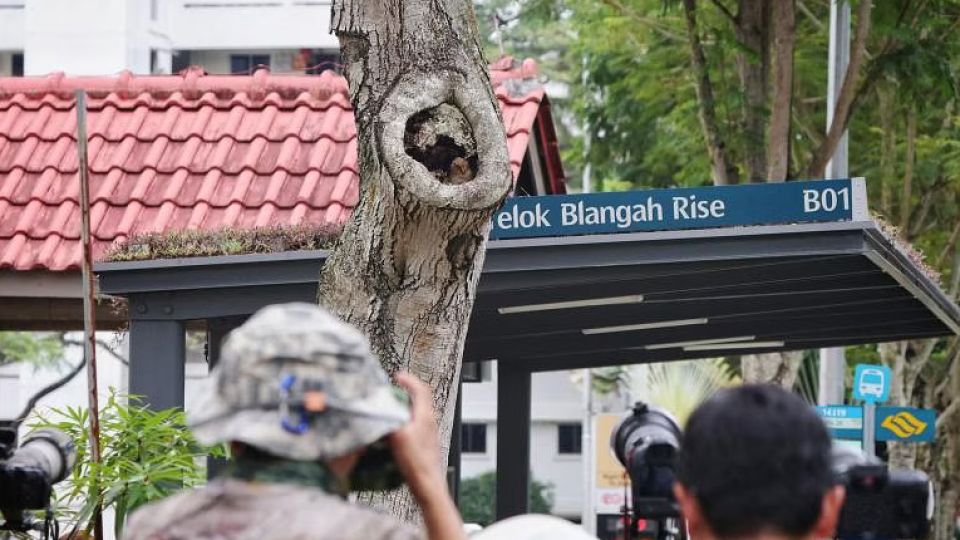May 10, 2024
SINGAPORE – The National Parks Board (NParks) has cordoned off an area in Telok Blangah after crowds started gathering near a nest of owls, which sparked concern from some about the well-being of the cute creatures.
The owls – identified as Otus lempiji, or Sunda scops owls – are native to Singapore, and known to nest in natural tree hollows and cavities. In this case, the nest was located next to a bus stop in Telok Blangah Rise, which made it easy for passers-by to spot.
The Singapore Wildlife Sightings Facebook group began seeing a deluge of photography posts featuring the baby owls – called owlets – around May 6, with the posts revealing the location of the nest.
On May 6, Facebook user Alvin Lim posted images of a large group of people attempting to photograph the owls. “Can we give some space for the birds?” he asked.
Commenting on another post, user Lim Khieng Siong said that while members of the Facebook group love to share and enjoy sightings of wildlife, he hoped everyone would keep a distance from the nest. “After all, most of the photographers are equipped with a good camera and lens, and should be able to capture photos from afar,” he wrote.
Echoing similar sentiments, another group member called Catherine Paul said it would be sad if the owlets died because their parents are “too scared” to approach the nests.
On May 7, the Animal Concerns Research and Education Society (Acres) advised people to keep their distance from wild owls in Singapore.
“While it’s incredibly tempting to capture those enchanting moments of wild owls in our urban jungle, their peace and quiet is very important when they are at a crucial phase of parenting – when the baby owls fledge and leave their nest,” said Acres.
“Approaching a wild owl’s family, especially during these moments, can put their well-being at risk – when they take those important steps to learn from their parents to fly, to feed and hunt!”
In response to queries from The Straits Times on May 9, NParks said that after it learnt of the nest on May 6, it cordoned off the area near the tree and installed signs to advise the public to maintain a safe distance.
It also urged people to refrain from visiting the site as large crowds and the resulting noise could disrupt the owls’ natural behaviour and cause undue stress.
“NParks would like to advise the public to appreciate wildlife from a distance and avoid disrupting their natural behaviours,” said NParks’ group director of wildlife management How Choon Beng.
“When photographing nesting birds, one should keep a distance to give them space and observe them in their natural state. Refrain from feeding or the use of artificial lures and calls to attract them and do not shine light or use flash photography as it may cause the birds to become stressed.”
People can call the NParks helpline on 1800-476-1600 if assistance is required.
As at May 9, there were more than 30 posts in the group on the owl nest, with the majority of them being photographs of the owlets and some debating the actions and intentions of people crowding around the area.
However, there were those who saw the increased human presence there in a positive light. “We need to come together and not point fingers at any one group,” commented user Ng Jasmin on various posts. “Each has a role to play. To take images of our wildlife as documentary and data keeping.”
A post in the group by user Art Toh also featured a video shared by his friend at the scene, showing a member of the crowd returning to the nest an owlet that had fallen out at about 2am on May 8.
“The few birders on site at this ungodly hour managed to return the owlet back to its nest, thus (preventing) a potentially tragic outcome,” he said.

